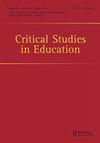Normalizing race in (gifted) education: genomics and spaces of White exceptionalism
IF 2.7
2区 教育学
Q1 EDUCATION & EDUCATIONAL RESEARCH
引用次数: 2
Abstract
ABSTRACT This paper utilizes the concept of ‘discriminate biopower’ to explore how advancements in social and behavioral genomics might inform the racially exclusionary nature of one of the most inequitable and academically coveted environments in American public education: gifted education. In its birth, gifted education became a mechanism for regulating the politics of race and equity in the American education system. Underpinning gifted education’s contested history is the conflation of Whiteness with exceptionalism and the proliferation of false genetic ideologies about biological differences between races. Genetics and education are re-intersecting today as social and behavioral genomics examine whether, how, and why genetic differences between individuals relate to differences in characteristics such as educational attainment or intelligence. This paper identifies three mechanisms through which social and behavioral genomics might be recruited for biopolitical governance strategies that maintain or exacerbate the racially exclusionary nature of gifted education: distractionism, determinism, and sociopolitical invisibility. Although these mechanisms are not predestined, researchers will need to employ proactive and socially responsible collaboration and communication to prevent genomics from normalizing racial exclusion in education.(天才)教育中的种族正常化:基因组学和白人例外主义的空间
本文利用“歧视性生物权力”的概念,探讨社会和行为基因组学的进步如何揭示美国公共教育中最不公平、最令人垂涎的学术环境之一:资优教育的种族排斥性。资优教育在其诞生之初,就成为美国教育体系中调节种族政治和公平的一种机制。天才教育有争议的历史背后,是白人与例外论的结合,以及关于种族间生物差异的错误基因意识形态的扩散。随着社会和行为基因组学研究个体之间的基因差异是否、如何以及为什么与教育程度或智力等特征的差异相关,遗传学和教育在今天重新交叉。本文确定了社会和行为基因组学可能被用于维持或加剧天才教育种族排他性的生物政治治理策略的三种机制:分心主义、决定论和社会政治不可见性。尽管这些机制不是命中注定的,但研究人员需要采取主动的、对社会负责的合作和交流,以防止基因组学使教育中的种族排斥正常化。
本文章由计算机程序翻译,如有差异,请以英文原文为准。
求助全文
约1分钟内获得全文
求助全文
来源期刊

Critical Studies in Education
EDUCATION & EDUCATIONAL RESEARCH-
CiteScore
10.10
自引率
5.10%
发文量
18
期刊介绍:
Critical Studies in Education is one of the few international journals devoted to a critical sociology of education, although it welcomes submissions with a critical stance that draw on other disciplines (e.g. philosophy, social geography, history) in order to understand ''the social''. Two interests frame the journal’s critical approach to research: (1) who benefits (and who does not) from current and historical social arrangements in education and, (2) from the standpoint of the least advantaged, what can be done about inequitable arrangements. Informed by this approach, articles published in the journal draw on post-structural, feminist, postcolonial and other critical orientations to critique education systems and to identify alternatives for education policy, practice and research.
 求助内容:
求助内容: 应助结果提醒方式:
应助结果提醒方式:


